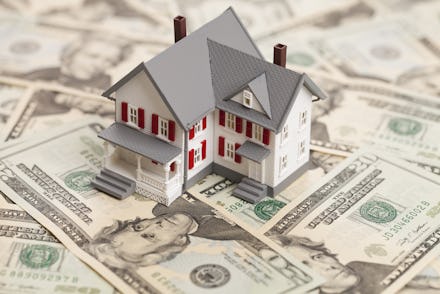Want to Buy a House or Apartment? How to Know If You Can Actually Afford a Home

Lots of people are buying homes in the United States, with one big exception: millennials.
Not only are fewer young Americans purchasing houses and apartments than a decade ago, but the most common living arrangement for millennials is not even renting with roommates — it's living with parents.
While owning your home is unlikely to make you rich, becoming a homeowner comes with big perks, including tax breaks and the sweet sensation of independence.
So if you have a bunch of cash saved up and feel increasingly inspired while perusing real estate listings, you might want to consider buying a pad while borrowing costs are still near record lows.
Just look before you leap: Ask yourself these three key questions before you take the plunge on homeownership.
Do I really have enough money?
Buyers are typically expected to put a 20% down payment on a home. So if, for example, the house you're eyeing costs $200,000, you may need to drop $40,000 upfront.
Even if you're lucky enough to be sitting on that much cash, beware spending it if you have other financial obligations to fulfill. As with other speculative investments, shelling out for a home should be secondary to adulting 101 moves like funding your retirement account.
All good on that front? Now get out your calculator.
The Federal Housing Administration allows a maximum debt-to-income ratio of 43% in order to qualify for a loan. You can figure out whether you pass the test by adding up all the monthly costs you would face as a homeowner (including the principal plus interest, escrow deposits for taxes, hazard insurance, mortgage insurance premium, and homeowners' dues) and dividing that amount by your monthly income.
For example, if buying an apartment would cost you $900 per month and you earn only $2,000 monthly, you probably are not equipped to buy a home at the moment as your debt-to-income ratio is 45%. (You might still be able to find a lender willing to provide a mortgage loan, but that doesn't make it a good idea.)
On the other hand, if your monthly debt would amount to only $400 — for a place you love, within your price range — then your debt-to-income ratio would only be 20%, and taking the leap to homeownership might indeed be financially sound.
An even simpler way of doing the math is to compare the hypothetical monthly payments to whatever you are currently paying in rent. Assuming it's a painful jump in monthly obligations, you might want to think twice.
Is now a good time to buy?
Speaking of ratios, there's another one that can come in handy when trying to assess if the housing market is in your favor.
"The ratio of prices to rents is a good determinant," Ralph McLaughlin, property listings site Trulia chief economist, said. "If rents are relatively high compared to prices, that means it's a good deal to buy a home because if you aren't buying a home, you're paying high rent. The opposite means it's a less of a good deal to buy because you could probably get a better deal if you rented."
Right now, it's generally a home buyers' market for two big reasons.
First, rent has been rising more quickly than home prices. Since there is a low supply of and high demand for rental units, rates are going up up up — even faster than other rocketing costs, like medical and healthcare prices.
Secondly, interest rates (read: the costs of borrowing) are hovering near all-time lows, with no rise expected in the immediate future. Even just since the recession, mortgage rates have dropped by about half. Today's rate for a 30-year fixed-rate mortgage, for example, is only about 3.4%.
Can I commit to the location?
A final consideration, McLaughlin said, is how long you plan on living in the home you are thinking of buying.
You need to feel good about not only the condition of the house or apartment, but also about the surrounding neighborhood and city or town. If you are on the fence, be careful: Generally speaking, it's not worth buying a home if you are just going to turn around and sell it after a few years. A good minimum range to target is 7 to 10 years, McLaughlin said.
Think hard about your employment prospects, she said. Might you need to move for work in the near future? What about your loved ones? The growing senior population means more and more young adults are finding themselves in the role of caregiver for aging parents.
If — after considering all these questions — you still feel ready to buy a home, more power to you.
Just get ready to drive a hard bargain.
Jessica Eggert contributed reporting.
Read More: